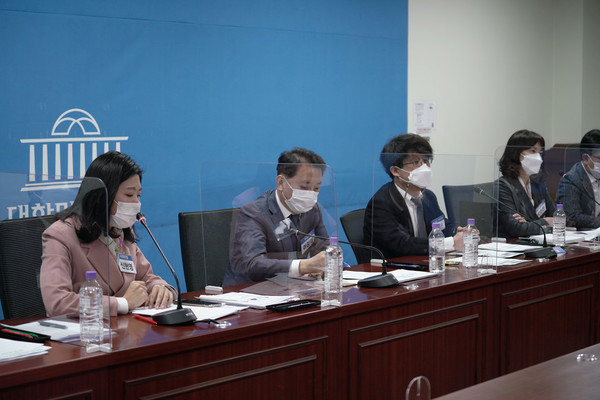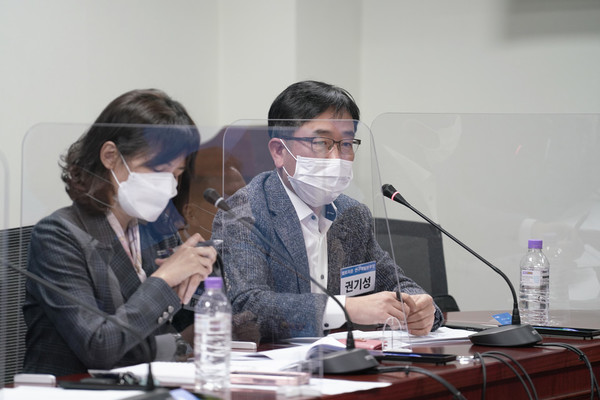Korean drugmakers at the forefront of developing a Covid-19 treatment gathered in Seoul to share how much progress their studies of investigational drugs have made.
On Tuesday, Democratic Party lawmakers Lee Kwang-jae, Hwang Hee, and Shin Hyun-young hosted a debate, “Dialogue with Future: Way to Covid-19-Free Country.” Executives in charge of treatment development at Celltrion, Daewoong Pharmaceutical, and GC Pharma presented each company’s experimental treatment status.

Celltrion: Regkirona’s effect was equal to that of treatments by Lilly, Regeneron
Kwon Ki-sung, head of Celltrion's research and development unit at Celltrion, explained the results of the clinical trial of Regkirona (CT-P59), an antibody therapy.
“Based on the clinical outcomes of patients with moderate Covid-19 patients, our drug yielded similar or better results than antibody treatments by Lilly and Regeneron. The outcome was better than expected,” Kwon said.
Celltrion completed the phase-2 study of Regkirona in December and applied for conditional approval. The company plans to release the full results at the 2021 High1 New Drug Development Symposium hosted by the Pharmaceutical Society of Korea on Wednesday.
“We hope to win approval within January,” Kwon said. The company has also applied for emergency use approval from regulators around the world, he added.
As each nation has a different review period, the company expects approval will take about two to six months, he said. “We expect some countries will grant the nod in March at the earliest,” Kwon added.
Celltrion plans to test the Covid-19 treatment on 1,200 patients in phase-2/3 trials in 15 countries in Europe, South America, and North America. The company aims to secure the results by May.
Regarding new Covid-19 variants, Kwon noted that Celltrion’s treatment candidate did not cause any problem in neutralizing six variants (S, V, L, G, GH, GR) circulating globally.
Celltrion’s investigational Covid-19 treatment is also effective against variants found in Spain, Brazil, and Australia, he said.
However, he added that Celltrion did not evaluate the treatment’s effect against variants found in the U.K. and South Africa.
“The variant from the U.K. did not occur at the antibody binding site. So, I think it will not affect our treatment,” Kwon said. “We’re discussing this with the Korea Disease Control and Prevention Agency (KDCA) and a U.S. research institute.”
As soon as the company secures the receptor-binding domain (RBD) of the virus variant, we will assess the safety.”
Kwon was optimistic about exporting Celltrion’s plasma therapy for Covid-19 treatment. According to Kwon, Celltrion discusses the issue with some countries as output by Lilly or Regeneron will not be sufficient to meet the demand of the U.S. alone. “After releasing the phase-2 study results on Wednesday, we will talk about exporting the plasma therapy more actively,” he said.
Rep. Shin noted that KCDA Commissioner Jeong Eun-kyeong said last week that the authorities would review using antibody treatment for Covid-19 patients at community treatment centers (CTC).
However, as CTCs are not medical institutions, they might not respond to side effects, cope with emergencies, and shortage of medical staff, she said. “In this sense, lawmakers will have to think about these issues,” she said.
Daewoong: Foista offers convenience as oral drug for Covid-19
Park Hyun-jin, head of drug development at Daewoong Pharmaceutical, spoke on the trial progress on Foista, an experimental treatment against Covid-19.
Daewoong’s Covid-19 therapy comes in three types – Foistar Tab. (camostat), Niclosamide Sustained-release Injection, and a stem cell intravenous injection.
The company is working on Foistar Tab. as an oral drug for patients quarantined at home or CTC.
“We’re developing Foistar Tab. like Tamiflu for influenza. Our goal is to make it a prescription drug to prevent and treat the disease,” Park said.

Foistar Tab. has both antiviral and anti-inflammatory mechanisms that could be effective in Covid-19 patients with not only mild but moderate and severe symptoms, she noted.
Since the market release in 2012, Foistar Tab. has caused no problem, according to Park. This guarantees the drug’s safety as Covid-19 treatment, she said.
So far, Foistar Tab. has reported a total of 40 adverse reactions, including 11 drug-related ones such as digestion-related reactions, hives, drowsiness, itchiness, and redness of the skin. The drug did not report any serious adverse reaction.
Last year, Daewoong completed the phase-2a study in 90 Covid-19 patients with mild symptoms and obtained approval for a phase-2/3 study in 1,000 patients. The company will start the trial with the first 300 patients this month and derive interim results.
Daewoong expects that it will secure the phase-3 study's interim results in March, at the earliest, or at least by April. “Given that we recruited patients for the previous phase-2 study in just two months, we will be able to secure phase-3 results quickly,” Park said.
She said she could not comment on the results of the phase-2 study of Foistar Tab. in detail because the results will be published in a paper in the future. However, she said that the company confirmed the drug’s effectiveness in “symptom normalization rate (NEWS Score).”
According to Daewoong, Foister-treated patients had a higher rate of symptom normalization compared to the placebo group. The treatment group had more than two-fold effectiveness in symptom improvement in oxygen saturation, auxiliary oxygen, and fever, compared to the placebo group, the company said.
“We confirmed a statistically meaningful difference in patients aged 60 or more or those with underlying diseases,” Park added.
GC Pharma: seeking conditional nod for plasma therapy in April
Lee Jae-woo, head of development at GC Pharma, explained about GC5131, a type of hyperimmune globulin drug that uses blood plasma collected from Covid-19 survivors.
GC Pharma has a platform that produces hyperimmune globulin agents for a specific antigen using a person's plasma exposed to the particular antigen.
Using this platform and plasma from recovered Covid-19 patients, the company is working on an immune globulin against Covid-19, Lee explained.
“As we utilize the already-established immune globulin production facilities, we can shorten the treatment development time,” he said.
Lee said GC Pharma’s plasma therapy is made of polyclonal antibodies by pooling plasma samples in various recovery stages. “Theoretically, our treatment has a neutralizing ability against many types of variants,” he emphasized.
GC Pharma administered the treatment to the first patient on Sept. 19 and prepared for a phase-2 study. The company finished recruiting 60 patients in December.
As of Sunday, 6,560 Korean Covid-19 survivors have registered for plasma donation. The company completed collecting blood from 4,139 people, excluding 2,267 with low levels of neutralizing antibodies. The regulator OKed using plasma therapy for 12 medical institutions to treat 30 Covid-19 cases as of Monday.
Unlike other Covid-19 treatment candidates, an immune globulin drug has a definite effect and causes no particular side effect, Lee said. “The demand is rising, so GC Pharma plans to provide the drug for free and gradually expand the supply,” he said.
GC Pharma’s development schedule has been slightly delayed, though. The company plans to complete the phase-2 study this month and complete the analysis on the trial results by March, Lee said. Then, in April, the company will seek conditional approval from the Food and Drug Safety Ministry.
At the debate, Rep. Kim Sung-joo of the Democratic Party asked why GC Pharma has yet to confirm the plasma therapy’s effect, despite a long time since the start of the drug development.
In response, Lee said the company would have the phase-2 results in March. “Hospitals use plasma therapy only when standard treatment does not work. So, it is difficult to verify the effectiveness of the plasma therapy alone,” he said.
GC Pharma collects data from plasma therapy-treated cases but has yet to find statistical significance, he added.

